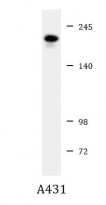ARG55880
anti-EHMT2 / G9A antibody
anti-EHMT2 / G9A antibody for Western blot and Human,Mouse
Overview
| Product Description | Rabbit Polyclonal antibody recognizes EHMT2 |
|---|---|
| Tested Reactivity | Hu, Ms |
| Tested Application | WB |
| Host | Rabbit |
| Clonality | Polyclonal |
| Isotype | IgG |
| Target Name | EHMT2 / G9A |
| Antigen Species | Human |
| Immunogen | KLH-conjugated synthetic peptide corresponding to aa. 361-395 (Center) of Human EHMT2. |
| Conjugation | Un-conjugated |
| Alternate Names | H3-K9-HMTase 3; GAT8; KMT1C; G9A; Euchromatic histone-lysine N-methyltransferase 2; Histone H3-K9 methyltransferase 3; Protein G9a; NG36; Lysine N-methyltransferase 1C; C6orf30; HLA-B-associated transcript 8; EC 2.1.1.43; Histone-lysine N-methyltransferase EHMT2; EC 2.1.1.-; BAT8 |
Application Instructions
| Application Suggestion |
|
||||
|---|---|---|---|---|---|
| Application Note | * The dilutions indicate recommended starting dilutions and the optimal dilutions or concentrations should be determined by the scientist. | ||||
| Positive Control | A431 |
Properties
| Form | Liquid |
|---|---|
| Purification | Purification with Protein A and immunogen peptide. |
| Buffer | PBS and 0.09% (W/V) Sodium azide |
| Preservative | 0.09% (W/V) Sodium azide |
| Storage Instruction | For continuous use, store undiluted antibody at 2-8°C for up to a week. For long-term storage, aliquot and store at -20°C or below. Storage in frost free freezers is not recommended. Avoid repeated freeze/thaw cycles. Suggest spin the vial prior to opening. The antibody solution should be gently mixed before use. |
| Note | For laboratory research only, not for drug, diagnostic or other use. |
Bioinformation
| Database Links |
Swiss-port # Q96KQ7 Human Histone-lysine N-methyltransferase EHMT2 Swiss-port # Q9Z148 Mouse Histone-lysine N-methyltransferase EHMT2 |
|---|---|
| Gene Symbol | EHMT2 |
| Gene Full Name | euchromatic histone-lysine N-methyltransferase 2 |
| Background | This gene is located in a gene cluster within the human major histocompatibility complex class III region on chromosome 6. This gene was thought to be two different genes, NG36 and G9a, adjacent to each other but recent publications show that there is only a single gene at this locus. The encoded protein is a histone methyltransferase, which may be involved in repression of transcription. Alternative splicing results in multiple transcript variants. [provided by RefSeq, Jan 2014] |
| Function | Histone methyltransferase that specifically mono- and dimethylates 'Lys-9' of histone H3 (H3K9me1 and H3K9me2, respectively) in euchromatin. H3K9me represents a specific tag for epigenetic transcriptional repression by recruiting HP1 proteins to methylated histones. Also mediates monomethylation of 'Lys-56' of histone H3 (H3K56me1) in G1 phase, leading to promote interaction between histone H3 and PCNA and regulating DNA replication. Also weakly methylates 'Lys-27' of histone H3 (H3K27me). Also required for DNA methylation, the histone methyltransferase activity is not required for DNA methylation, suggesting that these 2 activities function independently. Probably targeted to histone H3 by different DNA-binding proteins like E2F6, MGA, MAX and/or DP1. May also methylate histone H1. In addition to the histone methyltransferase activity, also methylates non-histone proteins: mediates dimethylation of 'Lys-373' of p53/TP53. Also methylates CDYL, WIZ, ACIN1, DNMT1, HDAC1, ERCC6, KLF12 and itself. [UniProt] |
| Cellular Localization | Nucleus. Chromosome. Note=Associates with euchromatic regions. Does not associate with heterochromatin |
| Calculated MW | 132 kDa |
| PTM | Methylated at Lys-185; automethylated. |
Images (1) Click the Picture to Zoom In






